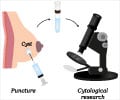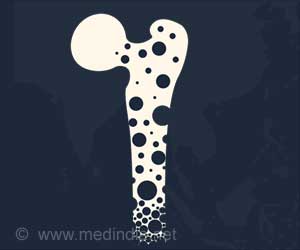Women studied who have breast cancer have mutations in a gene important in controlling cell growth and death, and that patients with mutations in p53 gene had poorer outcomes.
In what is believed to be the largest study of its kind in the US, researchers have found that almost 26 percent of women studied who have breast cancer have mutations in a gene important in controlling cell growth and death, and that patients with mutations in this gene – known as p53 - had poorer outcomes including a significantly increased risk of death from the cancer.
Researchers say their study, presented at the Annual Meeting of the American Association for Cancer Research (AACR), confirm the findings of other smaller studies, and is an important step forward in understanding risk factors that lead to development of breast cancer.For example, the investigators have found that postmenopausal women with high body weight were more likely to have a particular kind of p53 mutation, but they say this link needs to be studied further.
"The p53 gene is the guardian of the genome because it signals the cell to repair DNA damage when that occurs. If we can find genetic or environmental risk factors that lead to damage of p53 or stress on the gene, we may be able to help prevent development of breast cancer as well as other cancers," says the study's lead investigator, Catalin Marian, MD, PhD, a research instructor of cancer genetics and epidemiology at the Lombardi Comprehensive Cancer Center at Georgetown University Medical Center (GUMC).
The work was conducted by research groups led by Peter Shields, MD, professor of medicine and oncology at Lombardi, and Jo Freudenheim, PhD, chair of social and preventive medicine at the State University of New York at Buffalo.
Scientists from both institutions are evaluating data from a population-based case-control study of breast cancer in New York. The Western New York Exposure and Breast Cancer (WEB) Study included 1,170 women diagnosed with breast cancer between 1996 and 2001 as well as 2,116 women without cancer, and is an effort to link lifestyle and environmental exposures to gene changes and development of breast cancer. In this part of the study, GUMC researchers isolated DNA from 803 breast cancer tumor samples, and screened them for DNA mutations in the p53 gene. They found the p53 mutation frequency among the cases to be 25.6 percent, and 95 percent of those were point mutations – a change in a single base nucleotide with another nucleotide.
They determined that a p53 mutation was most commonly associated with ER-/PR- tumors in premenopausal women, but among postmenopausal women with breast cancer, the presence of a p53 mutation was most commonly associated with higher body mass index (BMI), and higher-grade, poorly differentiated tumors. Women with these tumors as well as p53 mutations had a 2.4-fold increased risk of dying from their disease, Marian says.
Advertisement
While either transition or transversion mutations were found in premenopausal with hormone receptor-negative cancer, only transition mutations (A or G replaced by each other) were positively associated in postmenopausal women with hormone receptor-negative cancers that were higher-grade and had a poorer outcome. Transversion mutations (A or G replaced by C or G or vice versa) in postmenopausal women with breast cancer were associated with a higher BMI.
Advertisement
Marian and his co-authors report no potential financial conflicts. This work was funded by the Department of Defense Breast Cancer Research Program and the National Institutes of Health.
Source-Eurekalert
SRM















